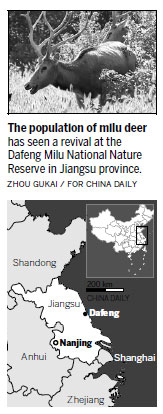Deer guardian finds satisfaction
Updated: 2016-08-18 07:56
By Xinhua In Nanjing(China Daily)
|
||||||||
When Ding Yuhua, 62, was first introduced to milu deer, the acquaintance was not a happy one.
But things have changed. Three decades on, he regards them as family, and his work has won him nationwide acclaim. He is known as the Guardian of Milu Deer.
Milu, also known as Pere David's deer, is a species native to China. Over hunting and loss of habitat led to its near extinction in the early 20th century.
In 1986, the British government gave 39 of the deer to Dafeng Milu National Nature Reserve in Jiangsu province, starting a revival of the population, which has existed largely in captivity.
The gift also started Ding's 28-year career as a milu keeper. With his care and years of research, the population has grown to 3,223.
Ding recalls being less than happy when he was assigned to the job three decades ago. A skilled veterinarian accustomed to tending cattle and sheep, he found the milu to be strange.
He knew it by its informal Chinese name, sibuxiang, which translates as "the four dislikes", referring to the animal's incongruous features: the neck of a camel, the hoofs of a cow, the tail of a donkey and the antlers of a deer.
The milu, which are naturally semi-acquatic, were not accustomed to the water and land in China. Many suffered severe diarrhea and dyspepsia. With no references or instruction, Ding and his colleagues could only rely on their past veterinary experience to treat them. During the first three months, he watched the animals around the clock, sleeping just two or three hours a day.
It was dangerous work, too. He suffered snakebites and heat stroke, and was once almost killed by a frenzied milu deer. His colleagues were scared away from the job, and some advised him to quit, but Ding refused.
"I have spent so much time with the milu, I think they are part of my life," Ding said.
One day, he discovered that a large, antlered buck had escaped over the wire fence. Ding was worried and began searching the vast swampland that covered more than 1,300 square kilometers.
The search lasted from summer to autumn. During the day, Ding walked for miles, crossing rivers and marshes, suffering insect bites and injuries from tree branches. At night, he climbed the trees with a flashlight, hoping to spot the shining eyes of the deer. He once woke from a nap to find himself hanging from a tree.
Finally, by following hoof-prints and droppings, Ding found the runaway by a river.
"I will never forget the scene," Ding recalled. "I was so relieved that all my efforts had paid off."
But he hesitated and stepped back.
Milu were kept in captivity for centuries. They should be free to roam, he thought.
From then on, Ding gave up fencing and began observing the milu through binoculars in a natural habitat. He always took a notebook and a flashlight, recording details of their feeding and other activities.
Keeping his distance resulted in a lot of discoveries. For example, milu prefer to stand against the wind to keep out the cold; they can eat about 100 kinds of plants, both land and aquatic; and their short cries signal fear.
His discoveries enabled the release of more captivebred milu deer into the wilderness. Soon, the first wild milu was born in the Dafeng reserve. On that day, Ding celebrated with a few cups of wine to welcome a "new family member".
Ding's real family often complained about his obsession.
"For the past 30 years, he has spent more time there than in his home," his wife, Cao Caiping, said.
His biggest regret is missing his father's funeral because of his work.
In 2014, Ding retired, but he continued writing essays and books, and sharing his experience with younger generations. His daughter studied milu conservation for her doctorate.
Ding said he is deeply grateful that people have joined him to care for the species. The team of milu keepers has grown from nine in 1986 to 80 this year, including a dozen with university degrees.
Plus, millions of students have learned about milu deer through their textbooks.
After the death of the buck, Ding and a colleague wrote a poem:
The beautiful land, your ancestors' home, Lives do not end, left for a long time, Fun in the wild, unforgettable days, My dear friend, rest in peace.

(China Daily 08/18/2016 page9)
- Diplomats vow progress on code of conduct
- China strengthens efforts to clean up 'dirty money'
- NDRC issues 3-year plan for growth in Northeast
- Volunteers help fellow expats stay within law
- Comfort women's 71-year wait for justice and apology
- China denounces Japanese cabinet members' visit to Yasukuni Shrine
- Malaysian authorities say ship carrying diesel hijacked
- Army commander: THAAD would 'easily affect' China-US ties
- Twin panda cubs confirmed born in Vienna zoo
- Four killed in boat collision in Greece
- Premier Li to receive Aung San Suu Kyi
- S Korean president names 3 new ministers for partial reshuffle

 Zhao wins China's first gold medal in men's taekwondo
Zhao wins China's first gold medal in men's taekwondo
 World's top 10 innovative economies
World's top 10 innovative economies
 Dancing, food and religion, all in a Xinjiang wedding
Dancing, food and religion, all in a Xinjiang wedding
 Men's table tennis overcomes singles loss to win team event
Men's table tennis overcomes singles loss to win team event
 China edges Brazil in volleyball quarterfinals
China edges Brazil in volleyball quarterfinals
 China's women's table tennis team sweeps gold
China's women's table tennis team sweeps gold
 Artists build sand sculptures to greet upcoming G20
Artists build sand sculptures to greet upcoming G20
 Top 10 biggest auto makers of 2015
Top 10 biggest auto makers of 2015
Most Viewed
Editor's Picks

|

|

|

|

|

|
Today's Top News
Trump outlines anti-terror plan, proposing extreme vetting for immigrants
Phelps puts spotlight on cupping
US launches airstrikes against IS targets in Libya's Sirte
Ministry slams US-Korean THAAD deployment
Two police officers shot at protest in Dallas
Abe's blame game reveals his policies failing to get results
Ending wildlife trafficking must be policy priority in Asia
Effects of supply-side reform take time to be seen
US Weekly

|

|







